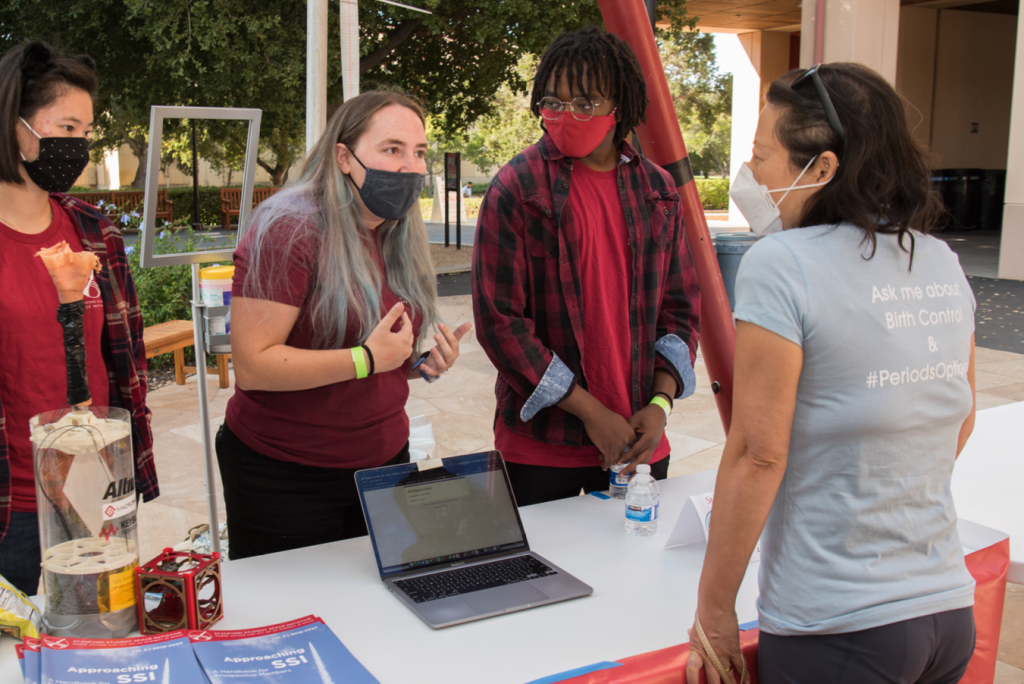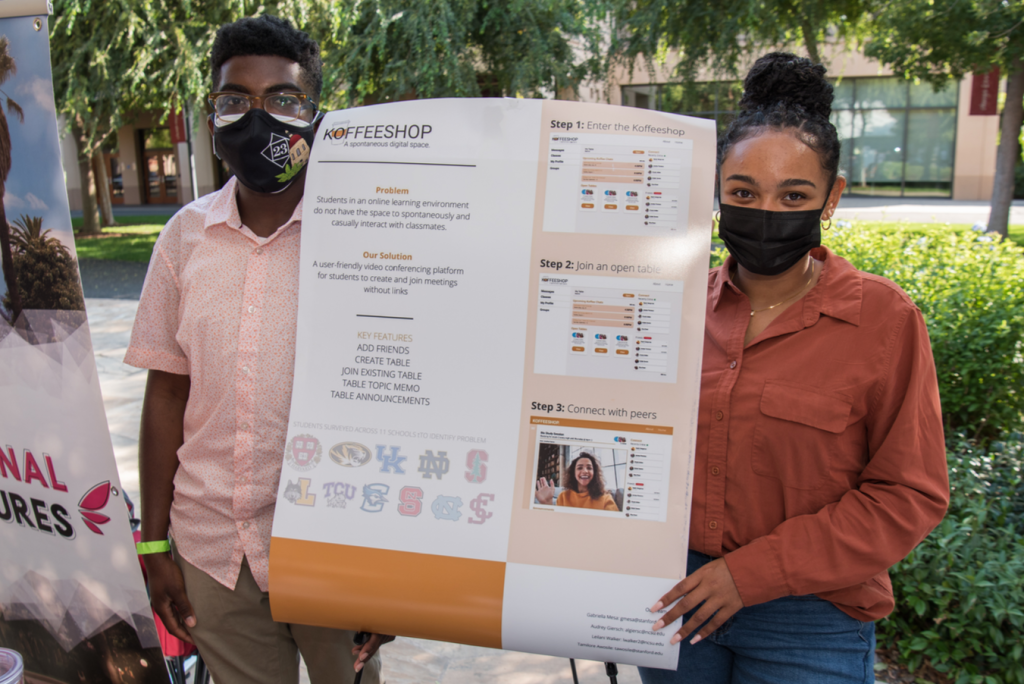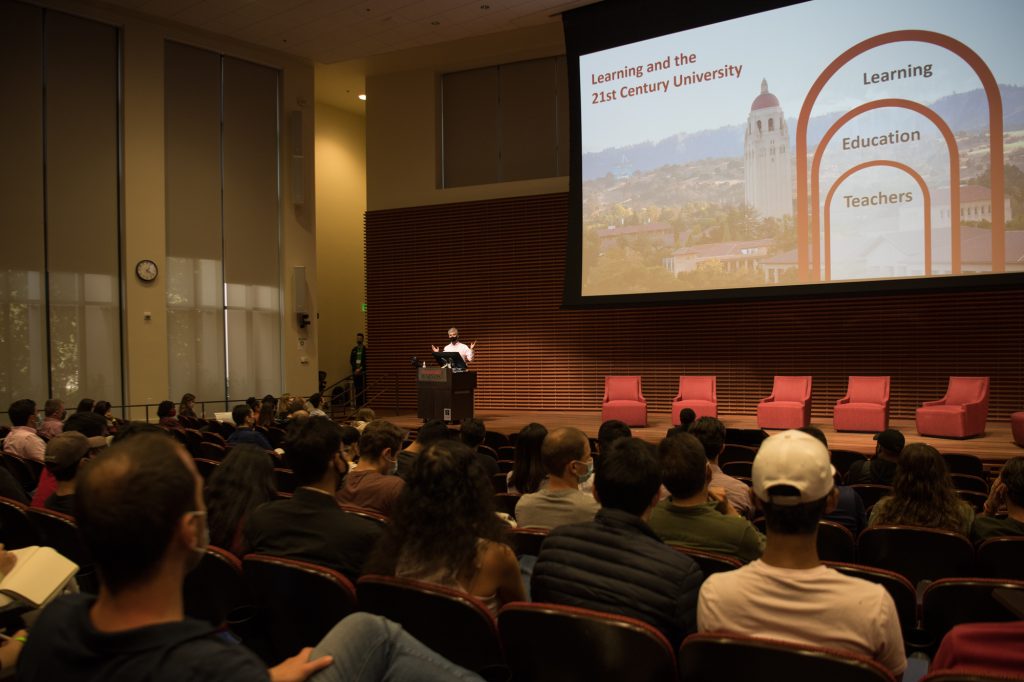Overview
The Learning Design Challenge fosters the creativity and problem-solving abilities of student teams across Stanford to build equitable and accessible learning experiences, leveraging the latest advances in the science and design of learning. The Stanford Accelerator for Learning supports the Digital Learning Design Workshops, which take place in the winter and spring quarters, giving students the opportunity to develop project ideas focusing on impact, meet and work with fellow student edtech entrepreneurs and build, prototype, and test digital learning tools and environments. Teams work with expert mentors in learning design and entrepreneurship from the Graduate School of Education, the Stanford Accelerator for Learning, and the edtech industry. At the culmination of each quarter, teams pitch their project to faculty and industry experts for funding. Since 2020, the Learning Design Challenge has been building a student community with a culture of collaboration and innovation in learning design and learning technology.
Learning Design Workshops
EDUC 254:
Winter Quarter: Project Development, 1-2 Credits
Spring Quarter: Design Sprints, 1-2 Credits
To develop your ideas and their potential for impact, meet and work with like-minded students, and build, prototype, and test digital learning tools and environments, join this series of workshops and mentoring sessions with Stanford and Silicon Valley experts.
What You’ll Do:
- Develop your own project ideas focusing on impact
- Find like-minded students & build effective development teams
- Apply human-centered design & UX principles
- Leverage learning science, AI, VR, game design & more in your designs
- Prototype digital environments/tools & test with end users
- Evaluate for-profit, non-profit & research potential
- Develop & deliver a winning pitch
“I have been immersed in the world of startups, but have never thought about what I was building in a critical manner. This course and the way it was designed have really made a difference for me and what it means to use technology that impacts and transforms lives ... I wish I would have encountered these principles sooner in my entrepreneurial journey.”
Jodi Anderson, Jr., Stanford Graduate School of Education, POLS Program
“Thank you for an amazing two quarters”
Chawin Asavasaetakul, Stanford School of Engineering, Management Science & Engineering
Winter Quarter Pitch Event
$1,500 Design Awards
At the end of Winter Quarter, student teams will be invited to pitch their project ideas to faculty and industry experts for $1,500 Design Awards for prototype development.

Spring Quarter Pitch Event
$9,000 Research Awards
At the end of Spring Quarter, student teams will again be invited to pitch their project ideas and demonstrate their prototypes to compete for Research-to-Practice Awards of up to $9,000.

“This Design Challenge has been an incredible learning experience.”
Gabriella Mesa, Stanford School of Engineering, Product Design
“Thank you for the opportunity and for the consistent advice throughout this past quarter. We greatly appreciated it!”
Gerta Guitart, Stanford Graduate School of Education, LDT Program
“We really appreciate your mentorship over the past few months.”
Johnathan Siktberg, Stanford Medical School
StartX Student-in-Residence Program
$9,000 Scholarship
Students will also be invited to apply for the StartX Student-in-Residence scholarship, a financial aid program intended to support student teams who are building a company or non-profit organization while completing their degree.
Students who receive the Student-in-Residence scholarship also earn exclusive access to structured ways of connecting with StartX's network of hundreds of highly experienced and industry-leading mentors to help think through decisions, including successful StartX entrepreneurs, VCs, Stanford faculty and alumni. Receive customized coaching, where you need it most, from top-notch coaches and domain experts.
Why Participate in the Design Challenge
- The Design Challenge gives students access to a series of workshops to grow your knowledge and your network. Workshops will focus on human-centered design processes, learning science and design, technical implementation, team building, and entrepreneurship.
- The Design Challenge and Start X provide students with an opportunity to win design awards and scholarships throughout various phases of ideation and prototyping.
- Participants will learn from mentors who provide support throughout the research, design, and development phases of their projects. Mentors include faculty experts, Silicon Valley experts, and near-peers with experience in development of digital learning experiences.
- Program alumni will be connected to a community of entrepreneurs, Stanford faculty, and Silicon Valley experts interested in leveraging both science and design to produce innovative learning solutions.


FAQ
Who can participate?
Current Stanford students, on their own or with a group, can participate in the challenge. Non-Stanford students can join as long as at least one member of a team is a Stanford student with a valid SUNet ID.
Do I need a project idea and a team to join?
You can come with a new project idea, or we can help you develop one through human-centered design processes. You can bring a team or build a team.
What will I learn?
You will learn to approach problems in education through a student-centered lens, using research and design to create solutions that have the potential for broad adoption. You will have the opportunity to develop and pitch for design awards.
Do I need to participate the workshops to submit an entry in the challenge?
EDUC 254 is highly recommended for students with limited experience in the science and design of learning. We encourage students to attend the course, solicit support from mentors, and develop ideas in teams. But the course is not required to submit an entry in the competition. Certain activities like practice pitching and participation in design sprints will be required.
What is the commitment?
EDUC 254 is a variable 1-2 credit course that can be taken both Fall and Winter Quarters. Students may audit the courses by special permission. Check with the course instructor.
How do I sign up?
Sign up for EDUC 254 in Axess.
Contact
Don’t hesitate to reach out
learningdesignchallenge@stanford.edu